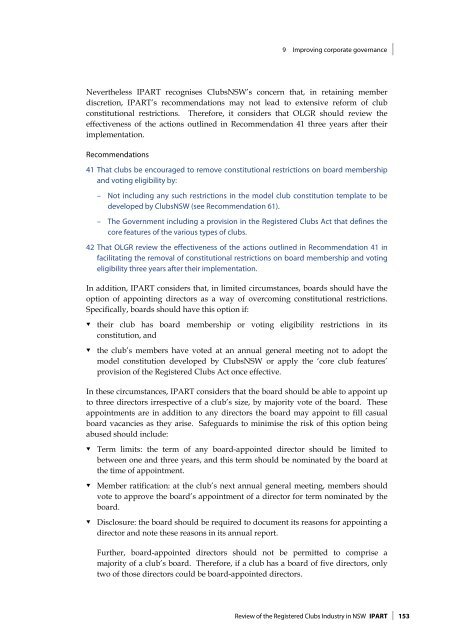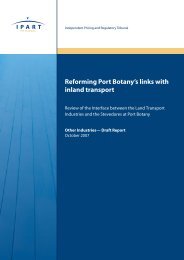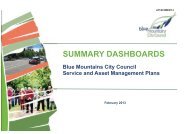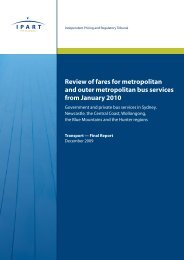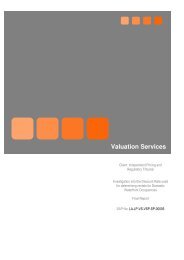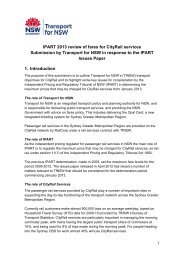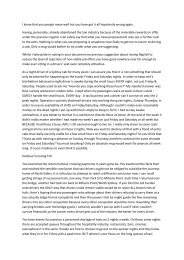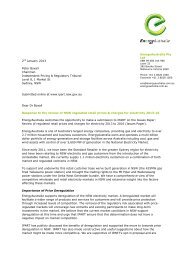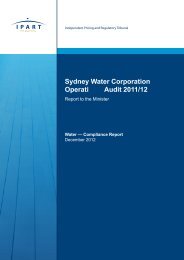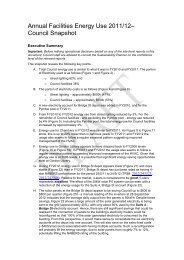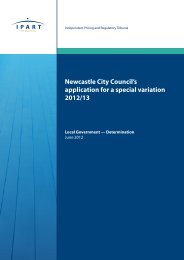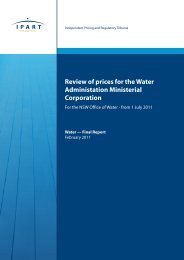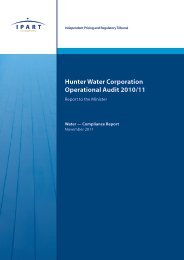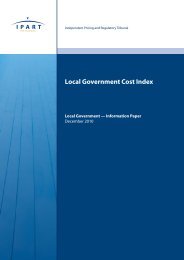Review of the Registered Clubs Industry in NSW - Clubs NSW
Review of the Registered Clubs Industry in NSW - Clubs NSW
Review of the Registered Clubs Industry in NSW - Clubs NSW
Create successful ePaper yourself
Turn your PDF publications into a flip-book with our unique Google optimized e-Paper software.
9 Improv<strong>in</strong>g corporate governance<br />
Never<strong>the</strong>less IPART recognises <strong>Clubs</strong><strong>NSW</strong>’s concern that, <strong>in</strong> reta<strong>in</strong><strong>in</strong>g member<br />
discretion, IPART’s recommendations may not lead to extensive reform <strong>of</strong> club<br />
constitutional restrictions. Therefore, it considers that OLGR should review <strong>the</strong><br />
effectiveness <strong>of</strong> <strong>the</strong> actions outl<strong>in</strong>ed <strong>in</strong> Recommendation 41 three years after <strong>the</strong>ir<br />
implementation.<br />
Recommendations<br />
41 That clubs be encouraged to remove constitutional restrictions on board membership<br />
and vot<strong>in</strong>g eligibility by:<br />
– Not <strong>in</strong>clud<strong>in</strong>g any such restrictions <strong>in</strong> <strong>the</strong> model club constitution template to be<br />
developed by <strong>Clubs</strong><strong>NSW</strong> (see Recommendation 61).<br />
– The Government <strong>in</strong>clud<strong>in</strong>g a provision <strong>in</strong> <strong>the</strong> <strong>Registered</strong> <strong>Clubs</strong> Act that def<strong>in</strong>es <strong>the</strong><br />
core features <strong>of</strong> <strong>the</strong> various types <strong>of</strong> clubs.<br />
42 That OLGR review <strong>the</strong> effectiveness <strong>of</strong> <strong>the</strong> actions outl<strong>in</strong>ed <strong>in</strong> Recommendation 41 <strong>in</strong><br />
facilitat<strong>in</strong>g <strong>the</strong> removal <strong>of</strong> constitutional restrictions on board membership and vot<strong>in</strong>g<br />
eligibility three years after <strong>the</strong>ir implementation.<br />
In addition, IPART considers that, <strong>in</strong> limited circumstances, boards should have <strong>the</strong><br />
option <strong>of</strong> appo<strong>in</strong>t<strong>in</strong>g directors as a way <strong>of</strong> overcom<strong>in</strong>g constitutional restrictions.<br />
Specifically, boards should have this option if:<br />
<br />
<br />
<strong>the</strong>ir club has board membership or vot<strong>in</strong>g eligibility restrictions <strong>in</strong> its<br />
constitution, and<br />
<strong>the</strong> club’s members have voted at an annual general meet<strong>in</strong>g not to adopt <strong>the</strong><br />
model constitution developed by <strong>Clubs</strong><strong>NSW</strong> or apply <strong>the</strong> ‘core club features’<br />
provision <strong>of</strong> <strong>the</strong> <strong>Registered</strong> <strong>Clubs</strong> Act once effective.<br />
In <strong>the</strong>se circumstances, IPART considers that <strong>the</strong> board should be able to appo<strong>in</strong>t up<br />
to three directors irrespective <strong>of</strong> a club’s size, by majority vote <strong>of</strong> <strong>the</strong> board. These<br />
appo<strong>in</strong>tments are <strong>in</strong> addition to any directors <strong>the</strong> board may appo<strong>in</strong>t to fill casual<br />
board vacancies as <strong>the</strong>y arise. Safeguards to m<strong>in</strong>imise <strong>the</strong> risk <strong>of</strong> this option be<strong>in</strong>g<br />
abused should <strong>in</strong>clude:<br />
<br />
<br />
<br />
Term limits: <strong>the</strong> term <strong>of</strong> any board-appo<strong>in</strong>ted director should be limited to<br />
between one and three years, and this term should be nom<strong>in</strong>ated by <strong>the</strong> board at<br />
<strong>the</strong> time <strong>of</strong> appo<strong>in</strong>tment.<br />
Member ratification: at <strong>the</strong> club’s next annual general meet<strong>in</strong>g, members should<br />
vote to approve <strong>the</strong> board’s appo<strong>in</strong>tment <strong>of</strong> a director for term nom<strong>in</strong>ated by <strong>the</strong><br />
board.<br />
Disclosure: <strong>the</strong> board should be required to document its reasons for appo<strong>in</strong>t<strong>in</strong>g a<br />
director and note <strong>the</strong>se reasons <strong>in</strong> its annual report.<br />
Fur<strong>the</strong>r, board-appo<strong>in</strong>ted directors should not be permitted to comprise a<br />
majority <strong>of</strong> a club’s board. Therefore, if a club has a board <strong>of</strong> five directors, only<br />
two <strong>of</strong> those directors could be board-appo<strong>in</strong>ted directors.<br />
<strong>Review</strong> <strong>of</strong> <strong>the</strong> <strong>Registered</strong> <strong>Clubs</strong> <strong>Industry</strong> <strong>in</strong> <strong>NSW</strong> IPART 153


